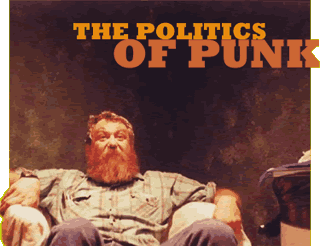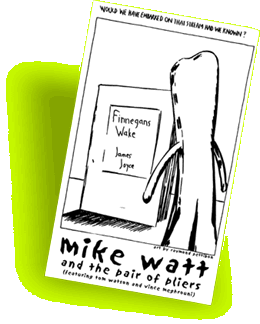
Mike Watt's touring again, as usual. But this time around he's singing a different tune. Following the release of his 1997 punk rock opera Contemplating The Engine Room and subsequent tours,Watt was suddenly a media darling -- even if the critics got the story wrong (as Watt says: "It's not about my father"). Today, the SST veteran and punk rock pioneer is moving beyond the tragedies of his past and focusing on the moment.
But Watt still remains loyal to the old punk rock DIY ethic, touring "econo," loading his own gear, playing the three-piece, and even selling his own T-shirts (refreshingly priced at a cool 10 bucks) after gigs. To Watt, punk is a lifestyle, a way of doing things, to which he remains loyal. Before a recent Watt show in San Francisco, GettingIt caught up with the man Henry Rollins once called "a one-man freakout." What follows is Watt's "spiel" on his new album, touring, politics, "alternative" music, and Gumby.
GI: How many miles you got on the Econo now?
MW: Two hundred thirty-eight thousand. There may be a couple more tours in there.
GI: When's the new album coming out? Are you working on it?
MW: I had a cat named Man, from the Minutemen days, and he passed away this summer. In fact my whole next record was going to be about him. I rewrote it all. I'm going to record it after this tour. It's my organ-drum-bass idea. I want to do a trio with the organ. It's different, I want to play aggressive in a way and the organ's got bass notes so I don't have to just do that. I don't know it that well, so it will be new for me.
I'm going to be 42 in December. So I'm not in the endgame, I'm not in the beginning game, I'm in the middle game. I'm trying to be in the moment -- because I wrote about the past. I was a Minuteman, but now I'm a second man. I'm gonna be in the second.
So I'm gonna call it The Second Man's Middle Stand. I don't know what people are going to think of it. It's going to be like a rally record for me. I got some songs like "Forward Said the Forty Man." They're pumped up songs because I feel kind of pumped up and I want to know what's on people's minds. I feel like I want to check out the barometer, see what's up.
GI: How many tours have you done now, 40-something?
MW: Something like that… 37.
The whole history of San Francisco gigs is intense. It was [The Minutemen's] first out-of-town gig. Bill Graham owned all the clubs. We made a point to play the guys who weren't under his umbrella. I thought, in the short distance, maybe the big man, yeah, but in the long run, he's holding everything, he's gonna start calling the tune. Where, if we support the indie cats... These cats weren't offering a better deal or anything, but we just saw something about owning -- like this Bill Gates thing -- owning all the marbles. It's not good, whether it's an operating system, or it's pads to play.
Big thing, especially with this "alternative" scene, is it's pretty heavy, to even have to be associated with it. It's no longer the cutting edge. It's not blowing minds, it's making some people some money, okay. It's making sure Bacchus is put back up in his little chair. You don't want the common man, the little man getting out of hand. So you go put him in some bubble pack and he'll find his place again. But for a while there it was kinda wild.
It's weird now. It's kinda institutionalized. Mexico's got the PRI, the institutionalized revolutionary party. That's kind of what "alternative" is. No fresh ideas, no rowdiness, but they are the party of overthrow.
I'm in the moment. So that's why I tackled the "A" word. Because other people, people from my [old] days, they won't even discuss the fact, and I don't blame them in a way. You can't be always talking about the good old ... they weren't good old days. They were days.
I still think there's wild fuckers out there, wild minds.
GI: Like who, for example?
MW: [Pauses]Yeah, just because Watt can't name 'em don't mean it ain't out there. [Laughs] Sometimes I find wild shit that's all wild and in this moment -- and the dudes are dead! And they're writing! So you can't really say they're in the moment. It's me bringing them in the moment.
GI: Like James Joyce?
MW: Yeah, exactly. Guy's dead. I just think there's another gauge for a barometer than just how hip the commercials are. Just because we get some of our songs on a commercial does not mean the war is won. If we all make The Clash the big band, we win? I mean, what the fuck?
That's what made punk not a style of music for me, it's some kind of state of mind. People like [Raymond] Pettibon. I learned most of my politics from Pettibon.

GI: What's up with Gumby, by the way? Why is he reading Finnegans Wake?
MW: Do you remember the Gumby show?
GI: No. Mostly when I think of Gumby I remember the Eddie Murphy sketch.
MW: Gumby used to be able to go into fucking books, but it was always kinda calm books, like an old western or something. Pettibon put it his way. Raymond has fun with the symbols that get woven into the fabric, into the culture -- it's the blanket we're going to sleep with. The big word in [Finnegans Wake], it was a hundred letters, baby. I don't even know how you pronounce it. But it would have gummed Gumby's little fucking clay brain up. Would he have gone into that book if he knew all the words he was gonna have to deal with? He also had this other one where [Gumby's] about to go in Mein Kampf.
GI: You've always been political, and I was just wondering how...
MW: Yeah as political as a bass player can get, or a voter gets.
Duchamp put art on the fucking toilet. He was trying to say "art's changed now. Art's about ideas, not so much about objects." That's what I try and say.
Now, as far as politics, politics is the neighbor's dog barking. What are we gonna do about it? It's not always just voting in a beauty contest every four years. It's about some guy changing his oil and the shit running down the storm drain.
GI: Did the opera album and tours kind of give you any catharsis [in reference to d. boon's death]?
MW: Sure, just being brave enough to do it. Just having the nerve. Oh! I was so scared to do the record, and then as I was doing the record every day I'd come in crying. That was a heavy thing, scary. I know it sounds silly, but to do it, to break the water, was heavy. Every one of them songs was a piece of the day, it was a life.
GI: Were you surprised at the reaction to it?
MW: Oh, people got it all wrong! They thought it was some way to think about my father. So ridiculous! I just used some stories about my dad's life to talk about the Minutemen. It was about the Minutemen! You know? Three guys in a boat. But I didn't want to be all that obvious about it.
My father's in it, he has a starring role, but it's not about him.
My father never knew my music, he never knew what it was. He knew it was something I did with d. boon as a boy. It really tripped him out when he found out I was still doing it after [d. boon] got killed. He didn't know I made a living at it. So I started sending postcards from the tour. And it dawns on him, my son travels around, my son is like a sailor. He's the first one who laid that on me. But he didn't have any music people in his family, he didn't know. And he thought it was like the most jack-off thing you could be doing in the world.
He never understood. I drive the van up there, and he sees the van out the hospice window, he's dying [of cancer] in the hospice. And it tripped him out -- he understood, in a way. What I did, I traveled around and played gigs for a living. And just because he didn't know anybody who did that, it was okay.
GI: I saw you sent something out a few weeks ago about low-power radio. I was wondering if you could talk about that a little bit.
MW: Yeah. Well, Tesla was into this. Resonance, not wires. He said wires were like the railroad. He came up with radio, and he wanted to charge up the earth, so we could use electricity for free.
That's elegant shit. Look at punk rock. How many chords? I'm going to keep going back to this. Because I tie in free expression with a little man, big system.
Relate this back down to your little band in the big music industry: Big KROCK radio station and your little pirate, Radio Free Berkeley. I think it's a fucking genuine fight and it's legitimate. I don't feel bad about it. Mother-fucking free speech, and opinion, and knocking down Berlin Walls in the brains. We can't say take a break on that shit or we're fucked. Just making everybody KROCK isn't going to do it.
You wonder why it says, "Take that Hüskers" on the Double Nickles record [cover]. You know, that would've never been a double album. We had an album done and then they come to town and did Zen Arcade, and we go, "Wow! We should do a double one, too." You need the pluralities. That's why it's scary, too, about little man, big system.
GI: Is that why you like playing in a three piece?
MW: Yeah, the three piece is econo. Also I'm a bass player. It's weird. So is this conversation. It's the rudderman. In the old days, when I got into it, bass is where you put the lame guy. But things change. Les Claypool, Flea. The virtuosos of the band were on the bass. And then there was Jack Bruce, and Johnny Entwistle.
I used to buy guitars in the thriftys. Fifteen bucks, hanging on a little tree, and I just took two of the strings off. We thought basses just had thinner necks. We didn't know they had big strings.
I remember the first time I saw a bass, it was way after I was doing this four string thing. And it was like, woah, motherfucker! What are those? Bridge cables? And it was 10th grade, first week of school, and I was telling some kids I played bass, I was in this band. It was called Bright Orange Band, because we liked Blue Oyster Cult. B-O-C, B-O-B. We were crazy. Anyway, I told this cat, "yeah, I play bass." [San Pedro, California] had one music store, (Truck Sound and Music) and I see this bass. Big old strings. And this guy sees me, goes, "I thought you played bass." And I said, "I do." He goes, "well that's a bass." And I go, "I know." But I didn't know. Blew my fucking mind.
Mat Honan is a senior editor at GettingIt. Even after all this, he still wonders what could be romantic to Mike Watt.
